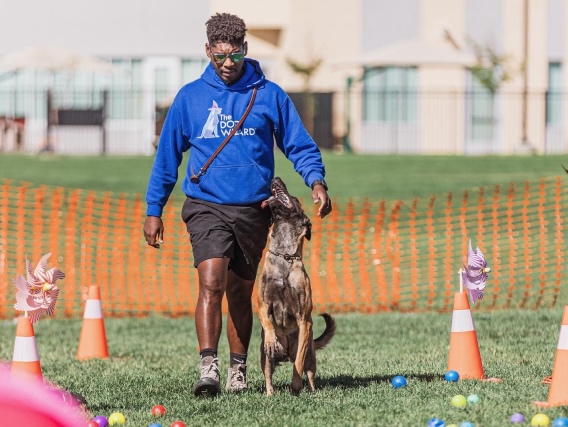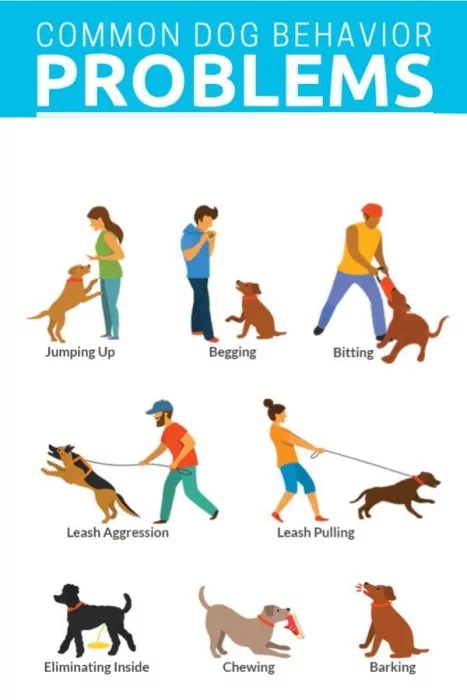Expert Insights on Dog Training Charlotte NC: Transform Your Pup Today
Expert Insights on Dog Training Charlotte NC: Transform Your Pup Today
Blog Article
Unlock Your Pet's Possible: Proven Dog Training Strategies for Success
Reliable pet training is a nuanced procedure that hinges on recognizing canine habits and employing medically backed methods. By incorporating positive support, establishing clear commands, and focusing on socialization, canine owners can grow an effective partnership with their family pets.
Understanding Pet Habits
Recognizing canine actions is necessary for effective training and cultivating a positive partnership between canines and their owners. A thorough grasp of canine body movement, vocalizations, and social communications is crucial for recognizing their demands and feelings. Canines interact mainly via non-verbal cues; for example, a wagging tail might suggest exhilaration, while pinned ears can signal worry or entry.

Furthermore, environmental factors play a substantial role fit a pet dog's actions. Adjustments in regular, brand-new environments, or the existence of unknown individuals can lead to tension or anxiety in dogs. Identifying these triggers makes it possible for proprietors to reduce unfavorable responses and develop suitable training strategies.
Inevitably, a deep understanding of pet dog habits lays the foundation for effective training techniques, improving both actions and the general bond in between the pet and its proprietor. dog training near me. This knowledge is essential for cultivating a well-adjusted, delighted canine companion
Favorable Reinforcement Techniques
Reliable training depends greatly on positive support methods, which have been revealed to yield substantial cause shaping wanted behaviors in pets. This technique involves awarding a dog for displaying specific behaviors, thus boosting the likelihood that these actions will be repeated. Incentives can take various kinds, consisting of treats, appreciation, playthings, or playtime, relying on what motivates the private pet.

It is important to progressively eliminate benefits as the pet dog learns the actions, transitioning to periodic reinforcement. This strategy keeps the habits over time while protecting against reliance on constant benefits. By concentrating on positive support, fitness instructors can grow a trusting relationship with their pets, promoting a cooperative and healthy and balanced training atmosphere that enhances general obedience and performance.
Developing Consistent Commands
A basic aspect of successful pet training is the establishment of regular commands. Consistency in commands is crucial for efficient communication between the pet and the trainer. When commands are consistent, canines find out to associate certain words with desired habits, which increases the training process and improves understanding.
To develop consistent commands, it is crucial that all member of the family use the very same terms and gestures. For instance, if a single person uses "sit" while an additional says "sit down," it can create complication for the canine. Select clear, distinctive words for commands and guarantee every person associated with the dog's training complies with these choices.
In addition, repeating is crucial. Enhance commands via constant method, ensuring learn this here now that the dog gets adequate chances to react appropriately. When a pet effectively adheres to a command, prompt favorable support needs to adhere to. This can be in the kind of deals with, appreciation, or play, strengthening the link between the command and the action.
Last but not least, be patient. Developing constant commands takes some time and effort. With you can try here dedication and clarity, you will certainly aid your pet dog establish a strong understanding of expectations, ultimately leading to a well-behaved companion.
Socializing and Direct Exposure
Interacting socially a canine is vital for promoting a certain and well-adjusted buddy. This process entails exposing your canine to a selection of environments, individuals, and other pets to develop their social abilities and adaptability. Early socialization, ideally in between the ages of 3 to fourteen weeks, is crucial, as it prepares for a canine's future actions.
During socialization, purpose to supply favorable experiences in various settings, such as parks, active roads, and homes with other animals. Present your pet dog to different stimulations, consisting of noises, views, and scents, making sure that each experience is gratifying. This direct exposure assists minimize anxiety and anxiousness, leading the way for a more resistant dog.
Taking part in controlled team play sessions with various other canines can likewise improve social abilities, teaching your animal proper interactions and boundaries. Constantly monitor your dog's convenience level throughout these experiences, gradually boosting exposure as their confidence grows. Remember, the objective is to create a well-rounded family pet that prospers in varied situations, advertising an unified relationship with both human beings and other pets. Focusing on socializing will dramatically contribute to your pet's total happiness and habits throughout their life.
Conquering Common Educating Difficulties

Canines might battle to concentrate in strange or hectic setups. Slowly desensitize your canine to distractions by beginning training in a quiet atmosphere and gradually introducing more stimuli as they become competent.
Additionally, behavioral concerns like leaping more information or excessive barking can become irritating. Address these by showing different habits, such as resting comfortably when welcoming guests. Consistency and perseverance are essential; reinforce wanted actions regularly and avoid scolding, which can bring about confusion.
Finally, recognize that each pet is distinct, and training timelines might differ. Dressmaker your approach to your canine's individual requirements, and seek professional assistance if necessary. With willpower and the best approaches, conquering these difficulties can bring about a well-trained, happy canine buddy.
Verdict
In conclusion, unlocking a pet's prospective demands a detailed method that integrates an understanding of canine behavior, the application of favorable support methods, and the establishment of constant commands. Early socialization and exposure to diverse settings better improve a canine's adaptability and self-confidence. By dealing with typical training obstacles with customized approaches and perseverance, a cooperative and harmonious partnership in between pet and handler can be fostered, eventually resulting in a mannerly companion with the ability of prospering in various situations.
Effective pet dog training is a nuanced process that hinges on understanding canine habits and employing clinically backed strategies.Comprehending pet dog behavior is necessary for efficient training and fostering a favorable relationship between dogs and their owners.Effective training counts heavily on positive reinforcement strategies, which have actually been revealed to yield substantial outcomes in shaping preferred habits in dogs. When commands are uniform, pet dogs find out to associate particular words with preferred actions, which speeds up the training procedure and boosts understanding.
In conclusion, opening a dog's potential requires a comprehensive technique that includes an understanding of canine actions, the application of favorable support strategies, and the establishment of consistent commands.
Report this page